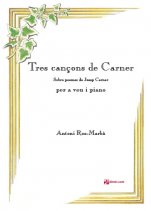Tres cançons de Carner for voice and piano

Inside Pages
Author/Composer
Text
Field
Music Schools and Conservatoires Advanced Level
Scores Advanced
Collection
Quaderns de cançó (publicació en paper) Nr. 17
Language
Format
Score
Contents
Toni Madigan tells us that he “sails against the current”, as he has never been affiliated with any “ism” or trend. For Ros-Marbà there are no specific or absolute references, nor particular organisational systems. Atonal passages do not seek to steer away from tonal sounds: moments experienced or readings help to discover sound and form. The search for an internal order derives from a more southern image where the qualities of sound resemble the Mediterranean gleam, without wishing to exploit the recurring cliché.
Lieder on text by Josep Carner call the voice to be delivered meticulously: it must utter with restraint, paying attention to the small details, to the ambiences imbued by the piano. The harmonies on fifths and sevenths create landscapes over which poetry flows.
• “Enyor” comes from the book Poesia, marked by Carner’s exile and the remoteness of a land that became his own, steeped in other memories. Ros-Marbà dedicated it to Eduard Toldrà’s daughter Narcisa in 2019.
• “Retorn a Catalunya” takes us to 1970, the date of Carner’s return. Ros-Marbà shares his love for the land through subtle but obvious sound gestures. The sonorous essence is made tangible, like the distant singing of a cricket.
• The sonnet “1714” was published by Carner on 11 September 1920. He was especially fond of the poem. However, the epic does not fit into Carner’s poem. The dissonances of the score tear up the fratricide of 1714. It is with a deafening silence that we hear how the city fell in 1714, mindful of the trembling of the wind, the interior sounds that derive from a “defeated people who survive the kings”.
January 2021
Technical Specifications
Measurements
21 x 29,7 cm, vertical
Binding
Staple, Staple and stretch wrapping
Shrink-wrap
Score and parts
Number of Pages
19
ISMN
979-0-69238-963-7
Editor
DINSIC Publicacions Musicals









